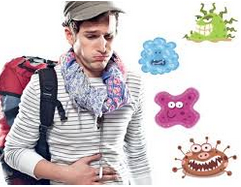Travellers diarrhoea is a common condition experienced by patients travelling to other countries, particularly less well developed countries with warmer climates. It is most commonly spread by poor sanitation and poor hygiene such as not washing hands after visiting the toilet. This type of diarrhoea is usually mild and self-limiting however patients with pre-existing health problems may experience more serious symptoms.

Symptoms of travellers diarrhoea
Travellers diarrhoea is usually described as the passing of watery or loose stools three or more times during one day whilst on holiday or shortly after returning home. Some people may experience other symptoms such as abdominal pain, high temperature, nausea and vomiting. The symptoms usually appear within two to three days of arriving at a destination and in most cases disappear within three to five days without treatment. Between 5 - 10 per cent of patients may experience symptoms that last for two weeks or sometimes even longer.
The groups that may be more at risk from developing complications brought about by travellers diarrhoea are:
- Young children and babies
- Pregnant women
- The elderly and frail
- Those with underlying health conditions such as heart disease, kidney disease, inflammatory bowel conditions, immune deficiencies including HIV parties and those taking immunosuppressing medication such as steroids, chemotherapy, or some medications used to treat rheumatoid arthritis and patients with stomach complaints
If a patient displays symptoms of dehydration they should always be referred to the pharmacist as they may need further medical attention.
Anyone experiencing one of the following complications should also be referred to the pharmacist:
- A high temperature of 38°C (100.4°F) or more
- Blood in the stools
- Difficulty retaining sufficient fluids due to frequency of passing watery stools or vomiting
- Diarrhoea that lasts longer than three to four days (adults)
Treating Travellers Diarrhoea
As previously stated most cases of diarrhoea clear up after three to four days without treatment but it is very important that fluids are maintained as dehydration can be the most common complication. You should recommend that if a patient experiences travellers diarrhoea then they should drink water, preferably bottled or filtered, diluted fruit juice or oral rehydration therapy.
Many people with diarrhoea will not feel like eating which won't do them any harm as long as they maintain their fluid intake but you should recommend that they eat as soon as they feel able.
Breastfeeding mothers should be advised to continue with their baby's regular feeding pattern as this will help to keep the baby hydrated, some babies may require more feeds to avoid dehydration.
